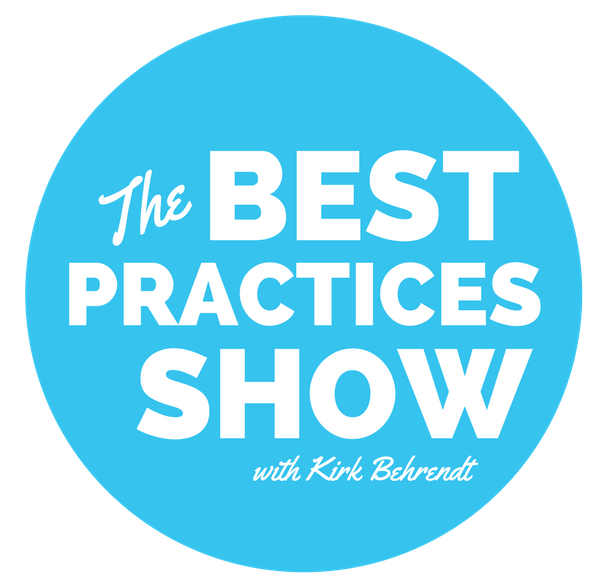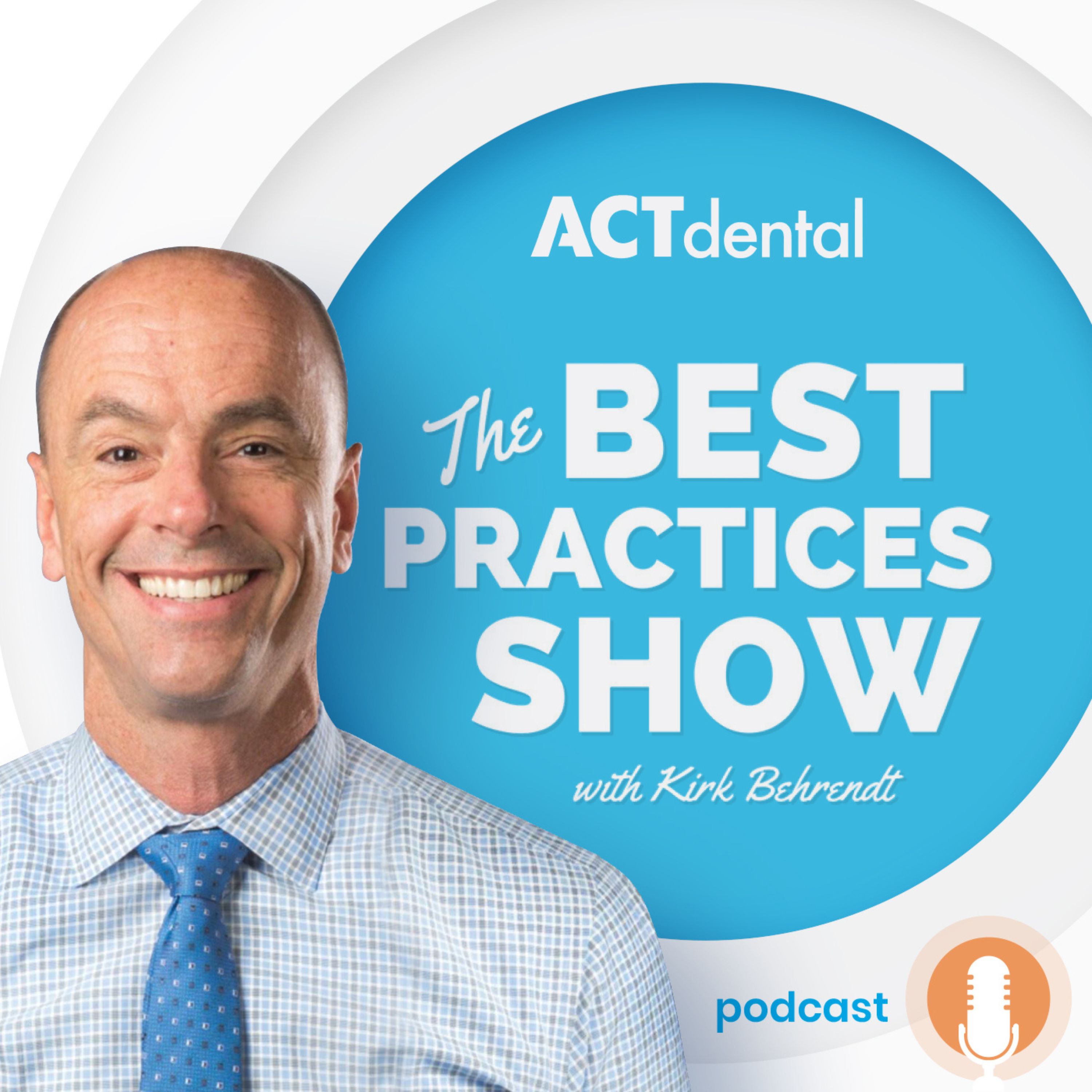Episode 322
322: Confessions of a Non-Practicing Pessimist - Robb Zbierski
Confessions of a Non-Practicing Pessimist
Episode #322 with Robb Zbierski
Human brains are hardwired for negativity. But we can choose to change this default setting! And to help you become more successful at life, Kirk Behrendt brings in Robb Zbierski from Freedom Personal Development with tips to manage your mindset. By changing your habits, perspective, and attitude, you can achieve the results you want with less effort! To tap into the power of your mind, listen to Episode 322 of The Best Practices Show!
Main Takeaways:
Human brains are hardwired to focus on negativity, urgency, and complacency.
Due to the hardwiring, people are subconsciously pessimistic.
Modern society and culture support this hardwired negativity.
Focusing on one problem sets off a chain reaction of problems in your brain.
You have the ability to change habits, thought processes, and perspectives.
Practice gratitude regularly, knowingly, and intentionally.
Quotes:
“Right, wrong, or indifferent, we are all born, we are all shipped from the factory. Our brains have certain default settings. We are hardwired to focus on specific things. The biggest ones that we see that actually hold us back, our brains are hardwired to focus on negativity, urgency, and complacency. The short version is, we think it sucks, we think it needs to be fixed right now, but we’re unwilling to contribute or do anything because that might be a little uncomfortable.” (09:38—10:07)
“Most people don't wake up going, ‘I'm going to be a jerk today.’ But the reality is, the way our brains are hardwired, we end up unconsciously being a jerk or being a pessimist because it’s a survival mechanism. Like caveman days, saber-toothed tiger days, we’re always looking for threats. Our brains are hardwired to look for threats so we live longer. Unfortunately, that tendency, that hardwiring, is buried deep in our DNA. And our challenge is that what our brain perceives as a negative input or a threat today, it’s just not the same as it was back in the caveman days.” (10:23—11:04)
“Grizzly bears, saber-toothed tiger, tribe with a stick and can throw a spear, is a threat. You're going to die unless you can address it. Today, like if you're going back to conferences and they don't have Starbucks out, you're like, ‘Argh, institutional coffee! Argh!’ Right? Your brain thinks that's the same thing. Or you throw a treatment plan out to your patient, and they're like, ‘Yeah, let me think about it.’ And you're like, ‘What? What do you possibly need to think about?’ Right? Or like, ‘I need more information.’ ‘Okay. Here’s the information. You have teeth. They need to be fixed. This is how to fix them. That's the information.’ And you go into defensive mode. You're like, ‘Why are you trying to shut down my practice by saying no?’ It’s like, you don't wake up going, ‘Who am I going to be pissed at today?’” (11:05—11:58)
“Ultimately, unconsciously, because of these unhelpful default settings, this hardwiring, we just end up having a lot of negative thoughts. And then, the reality is, we do live in a culture that I think kind of helps promote this. Right? Like, the news and social media. The reality is, you turn on the news, it’s the worst thing in the world. Or you read the paper, it’s like, if it bleeds, it leads. That’s what sells newspapers and magazines.” (13:34—14:05)
“You have tools at your disposal that are inside of you. They're free, they work. But being aware of them and cultivating the skill is actually proven to overcome all these “default settings”. And so, as it relates to overcoming pessimism or overcoming your brain’s natural tendency to focus on the negative, ultimately, we’re talking about attitude.” (17:23—17:47)
“There are mindset management tools that you can use that are simple, and they work . . . It’s your ability to laugh, your ability to practice gratitude, and your ability to manage your mental input. Those are the three big tools that you have at your disposal.” (18:18—18:38)
“Pay attention to your input sources, and that in and of itself can change your life. You pay attention to what you watch, what you read, what you listen to. You pay attention to the questions you ask yourself, or the way you talk to yourself, and you pay attention to the people you surround yourself with.” (18:45—19:00)
“Choose to be a non-practicing pessimist, because everyone is born with this “default setting”. Your brain is naturally going to gravitate towards negativity; it’s not your fault. It’s not your fault, but you have the ability to change it.” (25:45—26:00)
“Regularly and knowingly and intentionally practicing gratitude is the number-one thing that will scientifically flip the switch from a-hole mode to productive, serving mode.” (27:01—27:16)
“Just by thinking about this [negative] thing, it manifests itself, and you hunch over, and your brow gets all furrowed, and you're just not the person people want to be around. The same thing happens in reverse when you intentionally focus on anything you're grateful for.” (28:49—29:12)
“Time management is not time management. It’s energy and focus management, and it just happens to be how much time you want to spend on what focus and with what type of energy.” (34:50—34:58)
“Pay attention to how you start and finish your day.” (36:25—36:27)
Snippets:
Robb’s background. (04:12—08:59)
Human brains are hardwired to be pessimistic. (09:21—11:58)
We live in a culture that supports the hardwired negativity. (12:21—15:39)
You can overcome the “default settings” of pessimism. (16:29—19:44)
We can control our brain in some capacity. (20:27—21:31)
Aggregation of marginal gains and the winning edge theory. (21:33—25:11)
Choose to be a non-practicing pessimist. (25:38—26:32)
Practice gratitude. (26:32—33:10)
The tool to get 10 hours back in a week. (33:32—35:49)
Robb’s contact information. (44:01—45:34)
Reach Out to Robb:
Robb’s Facebook: https://www.facebook.com/robb.zbierski
Freedom Personal Development website: https://freedompersonaldevelopment.com/
Robb’s Twitter: https://twitter.com/robbzspeaker?lang=en
Robb’s Instagram: https://www.instagram.com/robbzspeaker/?hl=en
Robb’s LinkedIn: https://www.linkedin.com/in/robbzbierski
Robb Zbierski Bio:
Robb Zbierski is a professional speaker, trainer, and personal coach with Freedom Personal Development. Working with companies across a broad spectrum of industries, Robb helps clients develop professional skills and positive mindsets that let them discover their potential and maximize their results.
Robb's purpose is to inject excitement into everything he does. This purpose provides Robb the means to guide others (and himself) to become more effective in what they do while enjoying every minute of doing it. Because when you can more effectively accomplish the things you feel like you NEED to do, it lets you have way more fun when it comes time to doing the things you WANT to do!
With a history of success in product management, sales, and marketing roles within the outdoor, bicycle, and fitness (aka "passion pursuit") industries, Robb Zbierski was notorious for bringing fun to the forefront while also encouraging people to embrace their passion and energy to get the job done. A dynamic and engaging speaker, Robb makes every effort to connect with the audience to help them understand what can be accomplished with the right attitude and work ethic.
An avid cyclist, runner, fisherman, and beer enthusiast, Robb has completed the infamous Triple Bypass bike ride, the Chicago Marathon, and is in the midst of a multiple decades run of never getting skunked on his annual fishing trip. Robb currently lives with his wife (Kate) and their twins (Effie and Charlie) in Arlington Heights, IL.


